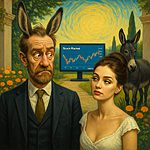Updated May 31, 2024
Market Uncertainty: Chaos and Bad Choices
Uncertainty, a state of being unsure or not knowing, can profoundly impact individuals. It’s a fundamental aspect of the human condition, often associated with negative emotions, but can sometimes be linked to positive feelings. The relationship between uncertainty and affect, or emotion, is complex and not fully understood, with various psychological disciplines offering different explanations.
Uncertainty can trigger anxiety as our survival brain, constantly updating our world, perceives it as a potential danger. This can lead to the creation of untested stories and assumptions as the mind tries to fill in the gaps of the unknown. Studies have shown that people are calmer in anticipating pain, which is specific than anticipating uncertainty. For instance, job uncertainty can take a more tremendous toll on health than losing a job.
Uncertainty can also impact our mental health, with intolerance of uncertainty being a hallmark of anxiety disorders and linked to other psychological conditions like depression and eating disorders. It can disrupt the quality of life, even for those who have not been diagnosed with a mental health condition.
Uncertainty can lead to stress and potentially irrational choices in decision-making. For instance, managers may display different risk attitudes when making personal versus company money decisions. To cope with these situations, our nervous system has to estimate, represent, and eventually resolve uncertainty.
Uncertainty can also impact our physical health. For example, uncertainty brought about by large-scale workplace reorganization was found to affect employees’ psychological and physical health, influencing job satisfaction and occupational stress.
Mastering Fear and Uncertainty in Trading: Navigating Challenges for Optimal Outcomes
Fear plays a significant role in trading, often influencing traders’ decision-making processes and leading to irrational behaviour and suboptimal outcomes. It’s a natural response to perceived threats or uncertain situations, protecting us from potential harm. In the context of trading, fear can manifest in several ways:
Fear of losing money: Traders may hesitate to enter trades or cut losing positions prematurely to avoid further losses.
Fear of missing out (FOMO): Traders may chase trades or enter positions at unfavourable prices to avoid missing out on potential gains.
Fear can also lead to a lack of confidence in one’s trading strategy, resulting in hasty and poorly thought-out decisions. For instance, traders might exit a trade prematurely, not trusting their technical analysis.
Moreover, fear can be fueled during runaway booms as investors hear about others’ newfound riches. The fear of missing out on these gains can lead to irrational trading decisions.
However, fear isn’t always detrimental. It can be a driving force that propels traders forward, pushing them to learn more about the market and develop effective trading strategies. By understanding and managing fear, traders can make more informed decisions, leading to better trading outcomes.
Navigating the Emotional Whirlwind: Mastering Fear and Uncertainty in Trading
Trading in the stock market transcends mere numbers and trends; it evolves into a psychological odyssey. Two emotions, fear and uncertainty, wield substantial influence on this journey. Understanding these emotions and adept management can profoundly elevate trading outcomes.
Fear, a formidable companion in trading, often materializes as a hesitance to enter trades, driven by the dread of financial loss. It may also prompt premature exits from trades, fueled by the fear of missing out on potential gains. This emotion can erode confidence in one’s trading strategy, resulting in impulsive and ill-considered decisions. Paradoxically, fear can also serve as a catalyst, motivating traders to deepen their market knowledge and refine their strategy.
Uncertainty, a more insidious counterpart, can prove even more detrimental. Shrouded in the ambiguity of an unknown future, it induces stress, anxiety, and indecision. Traders grappling with uncertainty may overanalyze market data, hesitate in decision-making, or make impromptu choices based on incomplete information. The fear of missing out can also arise, compelling traders to pursue trades at unfavourable prices.
Yet, akin to fear, uncertainty possesses a dual nature. Acknowledging it as an inherent facet of trading liberates traders to focus on controllable aspects, such as refining strategies and risk management. Embracing uncertainty fosters a commitment to staying informed about market dynamics, effectively mitigating its disruptive impact.
Several strategies can be employed to manage fear and uncertainty in trading:
1. Acceptance: Embrace fear and uncertainty as integral components of the trading experience, enabling a more adept response.
2. Mindfulness: Cultivate presence and concentration, steering clear of dwelling on past errors or fretting over future outcomes.
3. Education: Stay abreast of market trends and dynamics, leveraging knowledge to diminish uncertainty and fear.
4. Risk Management: Implement robust risk management strategies to safeguard investments and mitigate the fear of financial loss.
5. Emotional Regulation: Adopt meditation and deep breathing to temper emotional responses to fear and uncertainty.
6. Resilience: Recognize setbacks as inherent to trading, cultivating resilience to rebound from losses and maintain equilibrium in fear and uncertainty.
Conclusion: Mastering Fear and Uncertainty, A Data-Driven Perspective
Empirical research underscores the profound impact of uncertainty on cognitive functioning and psychological health. A study in the Journal of Neuroscience (2016) revealed that uncertainty can trigger stress responses, negatively affecting physical and mental health. This underscores the importance of mastering one’s reactions to uncertainty for maintaining cognitive health and making informed decisions.
Mastering fear and uncertainty becomes even more critical in trading. According to a report by the Journal of Behavioral Finance (2010), traders who effectively manage their emotions, including fear and uncertainty, perform significantly better than those who don’t. They can navigate market challenges, make calculated, data-focused decisions, and maintain a steady hand even in volatile situations.
This proficiency in managing fear and uncertainty can lead to improved trading outcomes. Case in point, a study by the International Review of Financial Analysis (2013) showed that traders who demonstrated emotional control and managed uncertainty well had a 20% higher success rate than their peers.
In conclusion, mastering fear and uncertainty isn’t just about enhancing mental well-being – it’s a critical skill set that can lead to more informed decisions, better trading performance, and a more rewarding trading experience overall.
Tasty Mental Treats
How Does Collective Behavior Tend to Be Ingenious in the Stock Market?















